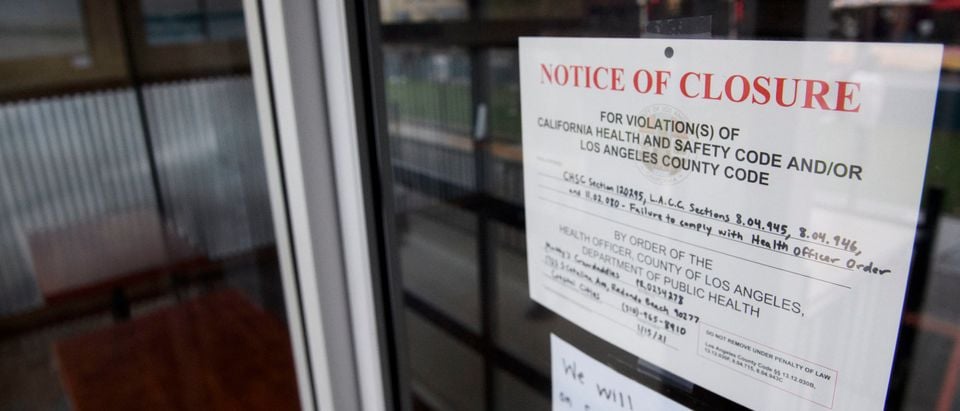In addition to the millions of Americans who had their health altered by the novel virus itself, tens of millions of Americans suffered financial and health consequences related to lockdowns. Hundreds of thousands of closed businesses, millions of laid-off employees and thousands of additional “deaths of despair” are just as big a part of the COVID-19 toll as anything else.
The initial wave of the pandemic alone in early 2020 cost the United States 22 million jobs, and some researchers estimate it could take four years to get them all back. The economic hardship was in part caused by harsh lockdowns imposed at the start of the pandemic, fully shutting down entire industries such as hospitality and tourism.
Prior to the most recent winter wave, nearly 4 million jobs were thought to be lost for good. Over the course of 2020, more than 8 million net jobs were lost and the unemployment rate almost doubled. Things were worse early on, with job losses remaining above 10 million well into the summer of 2020.
The pandemic has seemingly begun to subside, and with it lockdowns have gradually fallen by the wayside. Some red states have opened up entirely, and even blue states are beginning to follow. (RELATED: ANALYSIS: Data Shows Dramatic Lockdowns Had One Completely Predictable Side Effect)
Still, things are worse now economically than before the pandemic. Monthly job losses in March of 2021 still totaled more than 6.2 million, compared to 4.2 million in March of 2020.
Like their workers, business owners have been hit hard too. Federal Reserve economists recently estimated that 200,000 more businesses closed permanently due to the pandemic than would have without it. Small businesses in the hospitality industry were hit particularly hard.
Some of the businesses that did survive are now struggling to adjust to a post-pandemic economy. Charlotte, North Carolina restaurant owner Jon Dressler said workers who were forced out of hospitality jobs.
“I think COVID forced people to look at all aspects of their lives, and the time and introspection to look at what they’re doing. People thought, ‘Hey, there are so many industries thriving during COVID … I’ll do something else,” he told Axios Charlotte.
Dressler said he’s gone from being short one part-time dishwasher pre-pandemic to now needing four new kitchen workers and ten servers. Those vacancies have been hard to fill with thousands of displaced restaurant workers leaving the industry for good.
Many big businesses, on the other hand, did quite well. CEOs saw their compensation levels rise to record levels in 2020. E-commerce giants like Amazon thrived in the era of working-from-home, while brick-and-mortar retailers were devastated by lockdown orders. (RELATED: Jeff Bezos Overtakes Elon Musk As Richest Person In The World After Tesla Stock Drop)
On the whole, the world’s billionaires reportedly gained nearly $4 trillion in wealth during the pandemic. The workers of the world lost nearly the same amount.
Workers around the world: lost $3.7 trillion in the pandemic
Billionaires around the world: gained $3.9 trillion in the pandemicIt’s the biggest one-year wealth transfer in history, yet somehow barely anyone is talking about it.
— Dan Price (@DanPriceSeattle) March 25, 2021
Increased business closings and upward wealth transfers sadly weren’t the only negative product of COVID-19 lockdowns. The nationwide opioid crisis, which took a step back in the public view as the coronavirus swept the country, intensified during restrictions.
A new study found that opioid overdoses increased by 29% in 2020 after the pandemic began. Beginning in mid-April 2020, emergency department visits for drug overdoses increased by up to 45% from 2019. (RELATED: McKinsey Reaches $573 Million Settlement With States For Role In Opioid Crisis)
Opioid deaths are often categorized as “deaths of despair,” and so it isn’t surprising to see that the increase in overdoses correlated with an increase in depression. Suicide rates overall didn’t actually increase in 2020, but reports of depression in young people skyrocketed as lockdowns denied them in-person school and work, social interaction and exercise at gyms. The number of insurance claims made in relation to mental health crises in teens surged.
Physical health worsened too, and not just for those who contracted COVID-19. Surveys have found that one in three Americans delayed or skipped medical treatment during the pandemic, either because healthcare services were harder to access or they were worried about contracting the virus. Furthermore, of those millions of Americans who lost jobs during the shutdowns, some portion lost their health insurance or could no longer afford healthcare necessities like insulin.
Doctors have documented the heart attack victims who waited longer to visit the ER, the cancer screenings that were delayed and the important checkups that were missed.
Brian R. Rah, chair of the Cardiology Department at the Billings Clinic, said an early drop in heart attack patients during the pandemic proved to be a sign of delayed care. He told The Washington Post about two patients who waited hours to come into the ER after experiencing chest pains, and both suffered substantial heart damage as a result.
“For a heart attack patient, the first hour is known as the golden hour,” Rah said. One patient had not come in due to a fear of contracting COVID-19, and the other came in the morning but left because the emergency room was overcrowded.
The data makes clear that the pandemic itself inflicted a great deal of pain on Americans.


